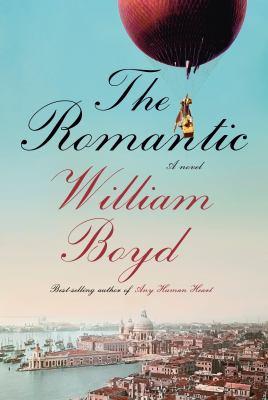
The romantic : the real life of Cashel Greville Ross : a novel
From one of Britain's best-loved and bestselling writers comes an intimate yet panoramic novel about the tumult and unexpected nature of life, set in the 19th century A new "whole life" novel from William Boyd, the author of Any Human Heart. Set in the 19th century, the novel follows the roller-coaster fortunes of a man as he tries to negotiate the random stages, adventures and vicissitudes of his life. He is variously a soldier, a farmer, a pawnbroker, a bankrupt, a jailbird, a writer, a gigolo - and many other manifestations - and, finally, a minor diplomat, based in Trieste (then in Austria-Hungary) where he sees out the end of his days.
Available Copies by Location
| Location | |
|---|---|
| Victoria | Available |
Browse Related Items
- ISBN: 9780593536797 (hardcover)
-
Physical Description
print
xi, 451 pages ; 25 cm - Edition First American edition.
- Publisher 2023
- Copyright ©2022.
Additional Information

The Romantic : A Novel
Click an element below to view details:
Excerpt
The Romantic : A Novel
Author's Note "I was born somewhere in Scotland, in the early morning of 14th December 1799. Later that day, the former President of the United States of America, George Washington, died at his home in Mount Vernon, Virginia. I believe there was no connection between the two events. It is my birthday tomorrow and I will be eighty- two years old." And so begins the unfi nished, disordered, somewhat baffling autobiography of Cashel Greville Ross (1799- 1882), an autobiography-- plus related material-- that came into my possession some years ago. It consists of around a hundred pages of handwritten reminiscences, dated December 1881, along with tied bundles of letters received, drafts of letters sent, some little sketches, maps and plans, some photographs, some published books filled with notes and marginalia, some small paintings, etchings and silhouettes and a few objects-- a tinder box, a musket ball, a belt buckle, a tiny brittle lock of hair tied with a faded silk ribbon, a few silver dollars, a fragment of Greek amphora, and so on. This small but intriguing trove was all that had eventually amounted from the life of this individual. It was, in a real way, everything that remained of him and was a fragmentary history of the time he had spent on this small planet. He had tried to write the story of his life, but failed. However fascinating, these scribbled pages and these few artefacts are not much upon which to construct a portrait of the man-- not much for a lifespan of eighty- odd years. What do we leave behind us when we die? At first it seems prodigious: all that mountain of "stuff " we acquire, all the possessions, the bric-a-brac and copious documentation accumulated over the average life. But inexorably, and surprisingly swiftly, it begins to diminish and after a few decades, a half- century, a century, it can amount to virtually nothing. It depends on who you are, of course-- but most people don't leave much of a trace or record behind them once their goods and chattels are dispersed; once the memories of this or that individual quickly blur and fade as the younger familiars die out themselves. Diaries and letters moulder and become either bland or incomprehensible; legal documents lurk unsought- for in filing cabinets and bank vaults; photographs of family and friends become unidentifiable-- become photographs of anonymous people-- and while anecdote and legend may survive a little longer, assuming that the person did anything of note or achieved any sort of fame, modest or otherwise, the fact is that for the huge majority of people in human history their fate, after a couple of generations or three, is to become effectively unknown, forgotten, a ghost. All that remains is a name on a headstone, a notation in a census- count, an online obituary, a mention in a newspaper and-- if they're lucky-- a date of birth and a date of death. So, who was this Cashel Greville Ross? What was the nature of his real life? How can its unique ontology be reconstructed? At least there is some evidence to hand, to begin with, but how far can it be trusted? There are many large, conspicuous gaps. To attempt to embark on writing a biography of this person-- a total stranger-- a man born well over two hundred years ago, seemed to me to be, if not entirely impossible, then an enterprise that would consist of meagre, unsatisfying supposition, in the end-- all "perhaps," "conceivably," "might have," "possibly." It would be half a life. Maybe that is true of biography in general. A wise man once said, "All biography is fi ction, but fiction that has to fi t the documented facts."* If this first part is correct, then perhaps it's a more interesting proposition to extend that licence. The objective should be to go further than the documented facts, to go beyond that boundary of the factual palisade. And, intriguingly, it is only fiction that allows us to do this. Instead of trying to write a biography of Cashel Greville Ross, I thought there was a very good case to be made that the story of his life, his real life, would, paradoxically, be much better served if it were written instead-- openly, knowingly, candidly-- as a novel. W.B. Trieste, February 2022 * Donald Rayfield, Anton Chekhov : A Life (new edition 2021), p. vi. Excerpted from The Romantic: A Novel by William Boyd All rights reserved by the original copyright owners. Excerpts are provided for display purposes only and may not be reproduced, reprinted or distributed without the written permission of the publisher.


